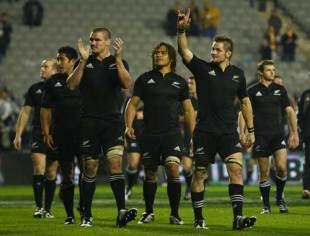|
2007 Tri-Nations
Chinks evident in All Blacks' armour
John Taylor
July 25, 2007
A third straight Tri-Nations, Bledisloe Cup winners for the sixth year in a row, a world record 26 consecutive home victories - take those statistics at face value and you would have to say New Zealand have confirmed their status as overwhelming favourites for Rugby World Cup. I'm not so sure. The other would be contenders will all have noted some chinks in the All Blacks' armour; somehow they don't appear quite so invincible - I think their Tri-Nations rivals and the European teams will have been encouraged by the events of the last five weeks. Australia's victory in Melbourne, South Africa's front-running for an hour in Durban and the All Blacks' total of only 8 tries in 4 matches show the gap has narrowed considerably. The air of total dominance has gone; you never felt it was only a matter of time before the All Blacks suddenly upped the pace and ripped the opposition defence apart; you never believed they were in a class of their own. At this stage last year the rest of the world feared just that. There were glimpses of greatness - the quality of the rugby that set up the two tries in the final 10 minutes from Richie McCaw and Joe Rokocoko in Durban (which turned a 21-12 deficit into a 26-21 victory) was breathtaking - but when the first choice players were on the field South Africa and Australia looked competitive, certainly in no danger of being overwhelmed. They have come a long way in the last two years The 2005 Lions were the first to feel the full force of Graham Henry's 'total rugby' philosophy and they were overwhelmed. Two years on the element of surprise has gone and some basic lessons have been learned. You do not under any circumstances kick the ball back to the All Blacks and invite them to counter-attack - they are devastating. You have to match their ferocity at the breakdown particularly after a tackle. Attack in isolation and you will be gang tackled and ruthlessly turned over. Miss a tackle and let them in behind you and you are dead. That was learning curve one. The next stage was to turn the tables and do exactly the same to them. South Africa matched them in the tackle area for long periods in this Tri-Nations, Australia managed to get in behind them to create scoring opportunities for their backs - the Springbok forwards with the Wallaby backs would really cause them problems. Everybody I meet seems to want to subscribe to the theory that, yet again, the All Blacks have peaked too early. Forget it. There is no better or more experienced coaching team in the world than Graham Henry, Steve Hansen and Wayne Smith. They will arrive in France with their team in perfect shape mentally and physically - put your house on it. Even their selection has been meticulous. You have to feel sorry for Piri Weepu who looked to be challenging Byron Kelleher for the starting scrum-half jersey three weeks ago and at very least appeared the ideal replacement. He had already booked a trip to France for his family. Suddenly, his form dipped, Brendon Leonard took his chance with a couple of sparkling cameos and with the young Canterbury half-back, Andrew Ellis, impressing for the Junior All Blacks Weepu was out. Henry is a hard man - he is also on a mission. Having made his money whilst coaching Wales he is desperate to cement his reputation at home by winning a second World Cup thereby proving New Zealand are not only number one in the rankings but also, indisputably, World Champions. The one area where he was not picking from huge strength is the midfield. He has some wonderfully talented players but no Tana Umaga. His departure has left a deep hole that he has been unable to fill. I am certain Henry wanted him to remain as captain until after the World Cup and New Zealand's attacking edge behind the scrum has been severely blunted by his retirement from international rugby. McCaw might be his natural successor but he is very much a leader of the pack. Nobody has been able to assume Umaga's leadership mantle in the back division. New Zealand back-lines have always been at their most effective when they have had a focal figure to call the shots. They are of a type - big, hard as teak but with a razor sharp rugby brain. Frank Bunce did the job in the early and mid 90s, Daryl Gibson carried it on and then Umaga took it to new heights. Without Umaga they are definitely not as powerful in attack (or defence). It is yet another ray of hope; New Zealand are definitely not as far ahead as they were this time last year but they are still the team to beat. |
Live Sports
Communication error please reload the page.
-
Football
-
Cricket
-
Rugby
-
- Days
- Hrs
- Mins
- Secs
F1 - Abu Dhabi GP
Abu Dhabi Grand Prix December 11-131. Max Verstappen ()
2. Valtteri Bottas (Mercedes)
3. Lewis Hamilton (Mercedes)
4. Alexander Albon ()
5. Lando Norris ()
6. Carlos Sainz Jr ()
-
ESPNOtherLive >>
Darts - Premier League
Golf - Houston Open
Snooker - China Open
Tennis - Miami Open


